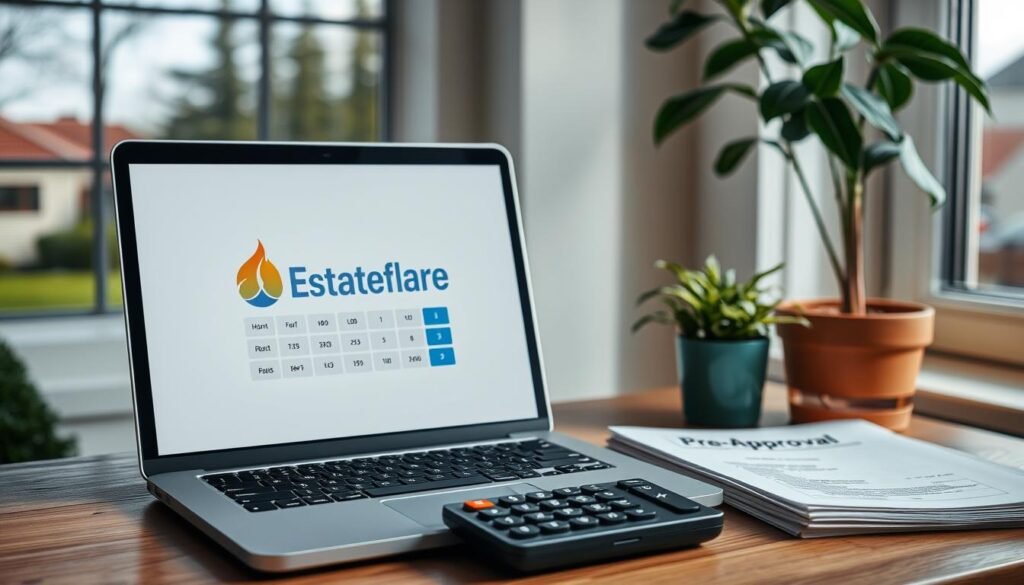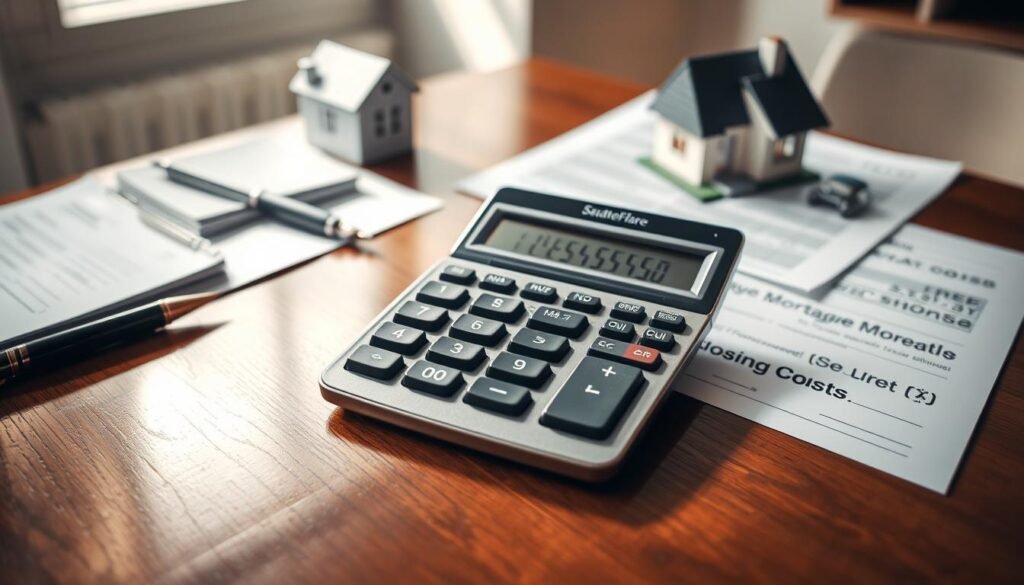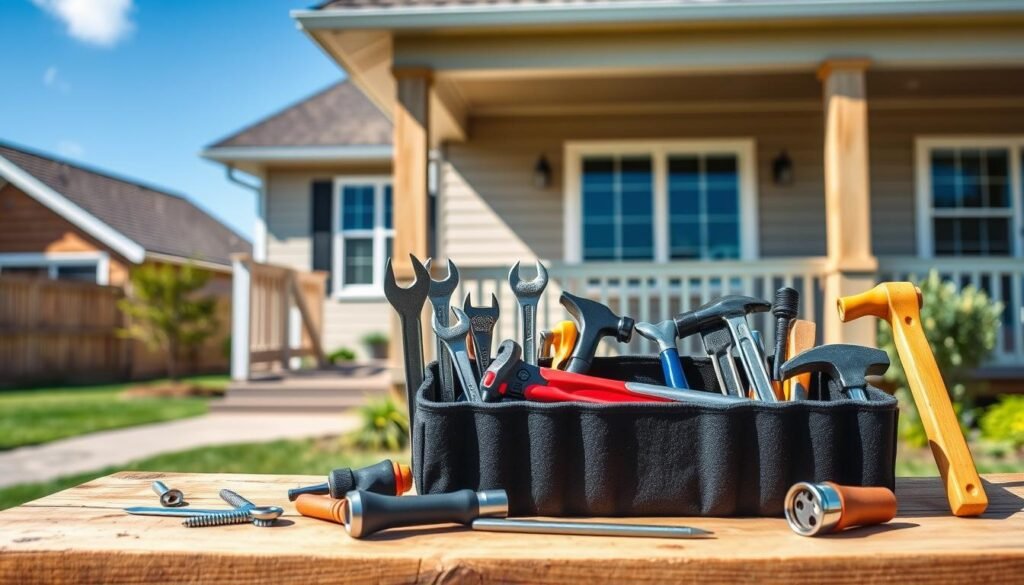Did you know the U.S. real estate market is worth $33.6 trillion? It’s one of the biggest asset classes globally. Whether you’re buying your first home or investing, the real estate market can be tough to navigate. This article will help you understand the key steps and things to consider before buying properties.
We’ll give you the knowledge and tools you need. This way, you can make smart choices and have a successful real estate deal.
Key Takeaways
- Understand the current state of the real estate market and factors influencing property values
- Obtain pre-approval for a mortgage to strengthen your bargaining position
- Conduct a thorough home inspection to identify potential issues and negotiate repairs or concessions
- Ensure a clear title and investigate property ownership details
- Estimate property taxes and homeowners insurance costs to budget effectively
- Prepare for moving and relocation expenses, including closing costs
- Explore financing options and compare mortgage rates and terms
Understanding the Real Estate Market
Exploring the real estate market can seem overwhelming. Yet, knowing what affects property values is key to smart choices. We’ll look at the factors that shape the market and guide you in making a wise purchase.
Factors Influencing Property Values
Location is a major factor in property valuation. The neighborhood’s appeal, its amenities, and the local economy all impact home values. Market trends, like supply and demand, also play a big role in pricing.
The property’s condition is another critical factor. The home’s age, construction quality, and any needed repairs affect its value. A detailed inspection and understanding maintenance costs are essential for a good decision.
Neighborhood Analysis and Amenities
Assessing the neighborhood and its amenities is vital. Look at local schools, parks, and access to shopping and dining. These aspects greatly influence a property’s value and livability.
By grasping the real estate market, evaluating properties, and examining neighborhoods, you can make a better choice. This knowledge helps you confidently find a property that fits your lifestyle and goals.
| Factors Influencing Property Values | Neighborhood Amenities |
|---|---|
|
|
“Investing in real estate is about more than just the property itself. It’s about understanding the broader market trends and the specific neighborhood characteristics that can make or break a successful purchase.”
Pre-Approval for a Mortgage
Getting a mortgage pre-approval is key before you start looking for a home. It lets you know how much you can borrow. This helps you feel sure when looking at homes.
To get pre-approved, you’ll need to share some financial info with your lender. This includes pay stubs, tax returns, and details about your credit and debt. Your lender will then figure out how much you can borrow and what interest rate you’ll get.
There are many good things about getting pre-approved. It shows sellers you’re serious and ready to buy. It also helps you look at homes that fit your budget, saving you time and stress.
Checking your credit report is very important before applying for pre-approval. A good credit score can help you get a better interest rate and loan terms. It’s worth fixing any mistakes in your report to improve your score.
Knowing your debt-to-income ratio is also key. This ratio shows how much of your income goes to debt each month. Lenders want this ratio to be 43% or less. Keeping it low can help you get pre-approved and make buying a home easier.
Putting in the work for pre-approval can really help you out. It gives you a clear idea of what you can afford. This makes finding the right home easier and less stressful.

“Getting pre-approved for a mortgage is one of the most important first steps in the home buying process. It helps you understand your borrowing power and gives you a competitive edge in the market.”
Conducting a Thorough Home Inspection
Buying a home is a big deal. A detailed home inspection is key to find any hidden problems. A good checklist helps spot issues and negotiate with the seller.
Identifying Potential Issues
A pro home inspector checks everything, from the foundation to the roof and systems. They give a report on any concerns, like structural issues or water damage. Knowing these problems helps you decide if the home is right for you.
Negotiating Repairs or Concessions
After the inspection, you can talk to the seller about fixes or credits. If big problems are found, you might ask the seller to fix them or give you money back. A good real estate agent can help you negotiate a fair deal.
| Home Inspection Checklist | Key Considerations |
|---|---|
| Foundation and Structure | Check for cracks, settling, or signs of structural issues |
| Roof and Exterior | Inspect for leaks, missing shingles, or damaged siding |
| Electrical System | Ensure the electrical panel is up to code and all outlets are functioning properly |
| Plumbing and HVAC | Check for leaks, water pressure, and the age and efficiency of the systems |
| Appliances and Home Features | Verify that all major appliances and features are in working order |
Using a detailed home inspection checklist and knowing how to negotiate can help you make a smart choice. This way, you can ensure you get the best deal on your new home.
Legal Title Search and Property Ownership
Buying a home is a big deal. It’s important to make sure the property has a clear title. A legal title search checks the property’s ownership history. It finds any issues or liens that could stop you from owning it fully. This step helps protect your investment and makes the buying process smoother.
A professional does the legal title search. They look at the property’s history, from the current owner back to the first owner. They check for things like mortgages, unpaid taxes, easements, or other issues that could affect your rights. Finding these problems early lets you make a better decision and solve any issues before you buy.
- Verify the property’s ownership history to ensure a clear title
- Identify any outstanding mortgages, liens, or other encumbrances that could affect your ownership
- Uncover potential issues that could lead to disputes or complications down the line
A detailed legal title search is key in buying a home. It gives you peace of mind, knowing you’re investing wisely. By checking the property’s history and ownership, you can buy with confidence. You’ll know your new home is free from legal problems.
“A legal title search is the first line of defense in protecting your real estate investment.”
Remember, a thorough legal title search is vital in buying a home. It helps you understand the property’s history and who owns it. By doing this, you make a smart choice and avoid future problems.
Estimating Property Taxes
When you buy a new home, knowing about property taxes is key. These taxes can greatly affect your housing costs. So, it’s important to get a good estimate. We’ll show you how to figure out property taxes, including what affects tax rates and assessments.
Understanding Tax Rates and Assessments
Property taxes usually depend on your home’s assessed value. This value is set by local tax assessors. It might not match the market value, and knowing how it’s assessed is crucial. Tax rates also vary by location, with some places having higher rates.
- Assess the property tax rate in the area where you’re considering buying a home.
- Understand how the local tax assessor determines the assessed value of the property.
- Research any applicable exemptions or credits that may lower your property tax burden.
Knowing what affects property taxes helps you estimate ongoing home costs. This knowledge lets you plan better and make informed decisions.
Homeowners Insurance Considerations
Understanding homeowners insurance is key for homeowners. Rates can change a lot based on different factors. It’s important to think about these when planning your budget for a new home.
The location of your home greatly affects insurance rates. Areas at risk for disasters like hurricanes or wildfires have higher premiums. The age and materials used in building also play a role. Newer homes and those with fire-resistant materials usually pay less.
| Factor | Impact on Homeowners Insurance Rates |
|---|---|
| Location | Homes in high-risk areas have higher rates |
| Age of Home | Newer homes typically have lower rates |
| Construction Materials | Fire-resistant materials can lead to lower rates |
When looking at insurance rates, think about how much coverage you need. Choosing a higher deductible can lower your monthly payments. But make sure the coverage is enough for any claims you might face.
“Homeowners insurance is a critical safeguard for one of the biggest investments you’ll make in your lifetime.”
Knowing what affects homeowners insurance rates helps you make smart choices. This way, you can plan your budget well for buying a home.

Before buying properties
Before you buy a property, it’s key to check your finances, goals, and lifestyle. This step makes sure your choice fits your financial and personal plans.
Here are some things to think about:
- Look at your current money situation, like income, savings, and debts.
- Figure out how much you can spend and what price range you can afford.
- Think about what you really need, like location, commute, schools, and type of property.
- Consider how the new home will meet your current and future needs.
- Think about the pros and cons of owning versus renting.
By carefully looking at these points, you can make a smart choice. This choice will help you feel secure and happy in the long run. Getting help from experts like real estate agents and financial advisors is also a good idea.
“Buying a home is a big decision that needs careful thought about your money and future plans. Taking time to think about it can lead to a happy and successful home-owning experience.”
| Criteria | Considerations |
|---|---|
| Financial Readiness | Income, savings, debt, budget, and future financial plans |
| Lifestyle Needs | Location, commute, schools, property type, and future living requirements |
| Professional Guidance | Real estate agents, mortgage lenders, financial advisors, and other experts |
By looking at your financial situation and lifestyle preferences carefully, and getting advice from experts, you can make a wise choice. This choice will help you feel secure and happy in your home-buying journey.
Calculating Closing Costs
Buying a home is more than just the price. Closing costs can add a lot to the total cost. It’s key to know the common costs and how to calculate them.
Common Closing Cost Items
Closing costs include various fees and expenses. Here are some common ones:
- Loan origination fees: Charged by the lender to process and underwrite the mortgage
- Title insurance: Protects the lender and buyer from any issues with the property’s title
- Appraisal fees: Covers the cost of the home appraisal required by the lender
- Attorney fees: Legal fees for the closing process
- Recording fees: Paid to the local government to record the deed and mortgage
- Transfer taxes: Taxes paid to the state or local government when the property is transferred
To estimate your closing costs, use a closing costs calculator. It helps you plan for the specific costs.
| Closing Cost Item | Average Cost |
|---|---|
| Loan Origination Fees | 0.5% – 1% of the loan amount |
| Title Insurance | 0.5% – 1% of the home’s value |
| Appraisal Fees | $300 – $500 |
| Attorney Fees | $500 – $1,500 |
| Recording Fees | $50 – $250 |
| Transfer Taxes | Varies by location (1% – 3% of home value) |
Knowing the common costs and using a calculator helps you prepare for the total cost of buying a home.

Preparing for Moving and Relocation
Starting your journey as a homeowner is exciting. But, moving and settling in can feel daunting. With good planning, you can make this transition smooth. Let’s look at what you need to do for a successful move.
Decluttering and Packing
Start by decluttering your stuff. Go through your belongings and decide what to keep, give away, or throw out. This makes packing easier and helps you start fresh in your new place. After decluttering, make a packing plan and get the right supplies like boxes and tape.
Coordinating with Movers
Getting professional movers can ease your stress. Look for good moving companies, compare prices, and book early. Tell the movers about your stuff and any special needs, like fragile items.
Updating Utilities and Services
Remember to tell your current service providers about your move. Set up disconnections at your old place and connections at your new one. This keeps your life running smoothly without interruptions.
| Task | Checklist |
|---|---|
| Decluttering and Packing |
|
| Coordinating with Movers |
|
| Updating Utilities and Services |
|
By following these steps, you’ll have a smooth move. Remember, being prepared reduces stress and makes the experience better.
Budgeting for Ongoing Maintenance and Repairs
Buying a property is a big investment with ongoing costs. Homeowners need to budget for regular upkeep and unexpected fixes. By making a maintenance plan and budgeting for these, your home stays in great shape and your money is safe.
Creating a Maintenance Plan
Managing home maintenance costs starts with planning. List all the upkeep your home needs, like HVAC checks and gutter cleaning. Then, figure out how much each task will cost and when to do them. Also, save some money each month for surprise repairs.
- Identify all routine maintenance tasks and their associated costs
- Create a maintenance schedule to ensure timely completion of tasks
- Allocate a portion of your monthly budget for unexpected repairs
By budgeting for ongoing maintenance and repairs and creating a maintenance plan, you can control your home’s financial future. This way, you avoid unexpected expenses later on.

“Preparing for home maintenance and repairs is crucial for maintaining the value and comfort of your property. With a well-crafted plan and budget, you can stay on top of these responsibilities and protect your investment.”
Exploring Financing Options
Buying a property means understanding your financing options. We’ll help you compare mortgage rates, terms, and loan programs. This way, you can find the best fit for your finances.
Comparing Mortgage Rates and Terms
Mortgage rates change based on your credit score, down payment, and loan type. It’s smart to compare rates from different lenders. Also, think about the loan terms, like the mortgage length and interest rate type.
Here are some key factors to consider when comparing mortgage options:
- Interest rates: Find the lowest rate to save on monthly payments and interest costs.
- Loan terms: Choose between a 15-year or 30-year mortgage based on your goals and budget.
- Loan programs: Look into conventional, FHA, VA, and jumbo loans to find the right one for you.
- Fees and closing costs: Compare the total costs of each loan, including origination and appraisal fees.
By carefully looking at your financing options and comparing rates and terms, you’ll make a smart choice. This will help you find the best loan for your home purchase.
“Exploring financing options and comparing mortgage rates is a crucial step in the home-buying process. It can make a significant difference in the long-term costs and affordability of your new home.”
Building a Support Network
Buying a home is exciting but can feel overwhelming. Having a strong support network of trusted professionals can make a big difference. They help ensure your home purchase is successful and stress-free. Let’s look at the key people who can guide you through this important decision.
Experienced Real Estate Agent
A good real estate agent is crucial in your home-buying journey. They know the market well and can find homes that fit your needs and budget. They also negotiate for you to get the best deal.
Their knowledge is especially useful in complex transactions. They can help you understand all the paperwork involved.
Skilled Real Estate Attorney
Getting a reputable real estate attorney is key. They review the purchase agreement and explain its legal aspects. They also check for any issues with the title or property.
They protect your interests during the transaction. Their help is especially valuable in tricky situations like foreclosures or short sales.
Trusted Financial Advisor
A financial advisor offers valuable advice on the financial side of owning a home. They help you understand how a mortgage affects your finances. They also explore financing options and advise on tax benefits and wealth-building strategies.
With a team of experienced professionals, you can confidently buy a home. They help avoid unexpected problems. Your support network guides you every step of the way, making your home purchase smooth and successful.

“Building a strong support network is the key to a successful home-buying experience. Surround yourself with knowledgeable professionals who can provide the expertise and guidance you need.”
HISTORIC BUILDING PROTECTION: PROS AND CONS
Conclusion
By following the steps and considerations in this guide, we’re ready to make smart choices. We’ll navigate the home-buying process with confidence. Remember, being well-prepared and paying attention to details are crucial for reaching our real estate goals.
The path to owning a home might seem tough, but we’re equipped to handle it. We can use the strategies and resources from this article at every step. From understanding the market to securing a mortgage and managing legal and financial aspects, we’re set to make informed decisions.
As we start this new journey, let’s seize the opportunities in the real estate market. By staying informed, planning carefully, and working with trusted professionals, we can make our dream of homeownership come true. The resources available will help us every step of the way, making our experience smooth and rewarding.



